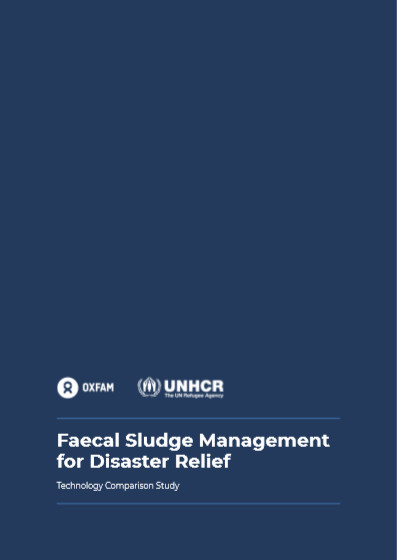Faecal Sludge Management for Disaster Relief: Technology Comparison Study
 |
manual May 2019 ; 96 páginas
Ed. ARUP - London UNHCR - Genčve OXFAM UK - Oxford
Formato descargable: PdF
Descargable desde el editor
Un editor presentación
Abstract:
Arup have conducted this technical comparison study of Faecal Sludge Management (FSM) techniques for disaster relief, on behalf of Oxfam UK (Oxfam). The aim of the study is to draw conclusions on best practice FSM for disaster relief, from evidence gathered through practical experience in the Rohingya refugee camps close to Cox’s Bazar, Bangladesh referred to as CXB throughout the report.
A comparison of the FSM technologies is provided in section 4 of this report, and guidance on technology selection for future disaster relief situations is provided in section 5. Details of each FSM technology visited in CXB are given in section 6.
1. Constructed Wetlands
2. GeoTubes
3. Lime (Three main types; lagoons, in barrel and three tanks)
4. Anaerobic Lagoons
5. Aeration Plant
6. Upflow Filters (Two main types; with and without pre-settlement)
7. Biogas
8. Anaerobic Baffled Reactors (ABR)
Destino Audiencia:
Actores de la Cooperación , Técnico , Ingeniero, diseńador , los políticos , Salud (profesionales de la)
Palabras claves: |
humanitaria de emergencia (CI) (DT) (HP) (ope) , lodos (CI) (DT) (HP) (ope) , tratamiento de lodos (CI) (DT) (HP) (ope) |
País: |
Editores/Difusores: |
|
ARUP - London - Reino Unido |
UNHCR
-
Haut Commissariat des Nations Unies pour les réfugiés - Genčve - Suiza |
OXFAM UK
-
OXFAM United Kingdom & Ireland - Oxford - Reino Unido |
Si hay un enlace roto, estaremos encantados de recibir un mensaje: communication@pseau.org